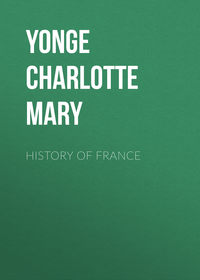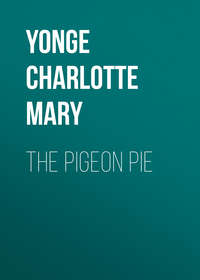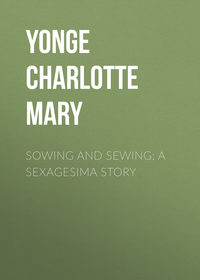
Chantry House
‘Nonsense, my dear,’ returned Mr. Fordyce, ‘Frank is in no danger. He will get on much better for knowing you are safe. Mrs. Winslow will tell you so.’
My mother was enforcing this assurance, when the little girl’s sobs burst out in spite of her sister, who had been trying to console her. ‘It is Celestina Mary,’ she cried, pointing to three dolls whom she had carried in clasped to her breast. ‘Poor Celestina Mary! She is left behind, and Ellen won’t let me go and see if she is in the carriage.’
‘My dear, if she is in the carriage, she will be quite safe in the morning.’
‘Oh, but she will be so cold. She had nothing on but Rosella’s old petticoat.’
The distress was so real that I had my hand on the bell to cause a search to be instituted for the missing damsel, when Mrs. Fordyce begged me to do no such thing, as it was only a doll. The child, while endeavouring to shelter with a shawl the dolls, snatched in their night-gear from their beds, wept so piteously at the rebuff that her grandfather had nearly gone in quest of the lost one, but was stopped by a special entreaty that he would not spoil the child. Martyn, however, who had been standing in open-mouthed wonder at such feeling for a doll, exclaimed, ‘Don’t cry, don’t cry. I’ll go and get it for you;’ and rushed off to the stable-yard.
This episode had restored Mrs. Fordyce, and while providing some of our guests with wine, and others with tea, we heard the story, only interrupted by Martyn’s return from a vain search, and Anne’s consequent tears, which, however, were somehow hushed and smothered by fears of being sent to bed, coupled with his promises to search every step of the way to-morrow.
It appeared that while the Fordyce family were at dinner, shouts, howls and yells had startled them. The rabble had surrounded the Rectory, bawling out abuse of the parsons and their machines, and occasionally throwing stones. There was no help to be expected; the only hope was in the strength of the doors and windows, and the knowledge that personal violence was very uncommon; but those were terrible moments, and poor Mrs. Fordyce was nearly dead with suppressed terror when her husband tried haranguing from an upper window, and was received with execrations and a volley of stones, while the glass crashed round him.
At that instant the shouts turned to yells of dismay, ‘The so’diers! the so’diers!’
Our party had found everything still and dark in the village, for in truth the men had hidden themselves. They were being too much attached to their masters to join in the attack, but were afraid of being compelled to assist the rioters, and not resolute enough against their own class either to inform against them or oppose them.
Through the midnight-like stillness of the street rose the tumult around the Rectory; and by the light of a few lanterns, and from the upper windows, they could see a mass of old hats, smock-frocked shoulders, and the tops of bludgeons; while at soonest, Sir George Eastwood’s troop could not be expected for an hour or more.
‘We must get to them somehow,’ said my father and Griff to one another; and Griff added, ‘These rascals are arrant cowards, and they can’t see the number of us.’
Then, before my father knew what he was about—certainly before he could get hold of the Riot Act—he found the stable lantern made over to him, and Griff’s sword flashing in light, as, making all possible clatter and jingling with their accoutrements, the two yeomen dashed among the throng, shouting with all their might, and striking with the flat of their swords. The rioters, ill-fed, dull-hearted men for the most part—many dragged out by compulsion, and already terrified—went tumbling over one another and running off headlong, bearing off with them (as we afterwards learnt) their leaders by their weight, taking the blows and pushes they gave one another in their pell-mell rush for those of the soldiery, and falling blindly against the low wall of the enclosure. The only difficulty was in clearing them out at the two gates of the drive.
When Mr. Fordyce opened the door to hail his rescuers he was utterly amazed to behold only three, and asked in a bewildered voice, ‘Where are the others?’
There were two prisoners, Petty the ratcatcher, who had attempted some resistance and had been knocked down by Griff’s horse, and a young lad in a smock-frock who had fallen off the wall and hurt his knee, and who blubbered piteously, declaring that them chaps had forced him to go with them, or they would duck him in the horse-pond. They were supposed to be given in charge to some one, but were lost sight of, and no wonder! For just then it was discovered that the machine shed was on fire. The rioters had apparently detached one of their number to kindle the flame before assaulting the house. The matter was specially serious, because the stackyard was on a line with the Rectory, at some distance indeed, but on lower ground; and what with barns, hay and wheat ricks, sheds, cowhouses and stables, all thatched, a big wood-pile, and a long old-fashioned greenhouse, there was almost continuous communication. Clouds of smoke and an ominous smell were already perceptible on the wind, generated by the heat, and the loose straw in the centre of the farmyard was beginning to be ignited by the flakes and sparks, carrying the mischief everywhere, and rendering it exceedingly difficult to release the animals and drive them to a place of safety. Water was scarce. There were only two wells, besides the pump in the house, and a shallow pond. The brook was a quarter of a mile off in the valley, and the nearest engine, a poor feeble thing, at Wattlesea. Moreover, the assailants might discover how small was the force of rescuers, and return to the attack. Thus, while Griff, who had given amateur assistance at all the fires he could reach in London; was striving to organise resistance to this new enemy, my father induced the gentlemen to cause the horses to be put to the various vehicles, and employ them in carrying the women and children to Chantry House. The old Rector was persuaded to go to take care of his daughter-in-law, and she only thought of putting her girls in safety. She listened to reason, and indeed was too much exhausted to move when once she was laid on the sofa. She would not hear of going to bed, though her little daughter Anne was sent off with her nurse, grandpapa persuading her that Rosella and the others were very much tired. When she was gone, he declared his fears that he had sat down on Celestina’s head, and showed so much compunction that we were much amused at his relief when Martyn assured him of having searched the carriage with a stable lantern, so that whatever had befallen the lady he was not the guilty person. He really seemed more concerned about this than at the loss of all his own barns and stores. And little Anne was certainly as lovely and engaging a little creature as ever I saw; while, as to her elder sister, in all the trouble and anxiety of the night, I could not help enjoying the sight of her beautiful eager face and form. She was tall and very slight, sylph-like, as it was the fashion to call it, but every limb was instinct with grace and animation. Her face was, perhaps, rather too thin for robust health, though this enhanced the idea of her being all spirit, as also did the transparency of complexion, tinted with an exquisite varying carnation. Her eyes were of a clear, bright, rather light brown, and were sparkling with the lustre of excitement, her delicate lips parted, showing the pretty pearly teeth, as she was telling Emily, in a low voice of enthusiasm, scarcely designed for my ears, how glorious a sight our brother had been, riding there in his glancing silver, bearing down all before him with his good sword, like the Captal de Buch dispersing the Jacquerie.
To which Emily responded, ‘Oh, don’t you love the Captal de Buch?’ And their friendship was cemented.
Next I heard, ‘And that you should have been so good after all my rudeness. But I thought you were like the old Winslows; and instead of that you have come to the rescue of your enemies. Isn’t it beautiful?’
‘Oh no, not enemies,’ said Emily. ‘That was all over a hundred years ago!’
‘So my papa and grandpapa say,’ returned Miss Fordyce; ‘but the last Mr. Winslow was not a very nice man, and never would be civil to us.’
A report was brought that the glare of the fire could be seen over the hill from the top of the house, and off went the two young ladies to the leads, after satisfying themselves that Anne was asleep among her homeless dolls.
Old Mr. Fordyce devoted himself to keeping up the spirits of his daughter-in-law as the night advanced without any tidings, except that the girls, from time to time, rushed down to tell us of fresh outbursts of red flame reflected in the sky, then that the glow was diminishing; by which time they were tired out, and, both sinking into a big armchair, they went to sleep in each other’s arms. Indeed I believe we all dozed more or less before any one returned from the scene of action—at about three o’clock.
The struggle with the flames had been very unequal. The long tongues soon reached the roof of the large barn, which was filled with straw, nor could the flakes of burning thatch be kept from the stable, while the water of the pond was soon reduced to mud. Helpers began to flock in, but who could tell which were trustworthy? and all were uncomprehending.
There was so little hope of saving the house that the removal of everything valuable was begun under my father’s superintendence. Frank Fordyce was here, there, and everywhere; while Griffith, like a gallant general, fought the foe with very helpless unmanageable forces. Villagers, male and female, had emerged and stood gaping round; but, let him rage and storm as he might, they would not go and collect pails and buckets and form a line to the brook. Still less would they assist in overthrowing and carrying away the faggots of a big wood-pile so as to cut off the communication with the offices. Only Chapman and one other man gave any help in this; and presently the stack caught, and Griff, on the top, was in great peril of the faggots rolling down with him into the middle, and imprisoning him in the blazing pile. ‘I never felt so like Dido,’ said Griff.
That woodstack gave fearful aliment to the roaring flame, which came on so fast that the destruction of the adjoining buildings quickly followed. The Wattlesea engine had come, but the yard well was unattainable, and all that could be done was to saturate the house with water from its own well, and cover the side with wet blankets; but these reeked with steam, and then shrivelled away in the intense glow of heat.
However, by this time the Eastwood Yeomanry, together with some reasonable men, had arrived. A raid was made on the cottages for buckets, a chain formed to the river, and at last the fire was got under, having made a wreck of everything out-of-doors, and consumed one whole wing of the house, though the older and more esteemed portion was saved.
CHAPTER XVIII
THE PORTRAIT
‘When day was gone and night was come, And all men fast asleep,There came the spirit of fair Marg’ret And stood at William’s feet.’Scotch Ballad.When I emerged from my room the next morning the phaeton was at the door to take the two clergymen to reconnoitre their abode before going to church. Miss Fordyce went with them, and my father was for once about to leave his parish church to give them his sympathy, and join in their thanksgiving that neither life nor limb had been injured. He afterwards said that nothing could have been more touching than old Mr. Fordyce’s manner of mentioning this special cause for gratitude before the General Thanksgiving; and Frank Fordyce, having had all his sermons burnt, gave a short address extempore (a very rare and almost shocking thing at that date), reducing half the congregation to tears, for they really loved ‘the fam’ly,’ though they had not spirit enough to defend it; and their passiveness always remained a subject of pride and pleasure to the Fordyces. It was against the will of these good people that Petty, the ratcatcher, was arrested, but he had been engaged in other outrages, though this was the only one in which a dwelling-house had suffered. And Chapman observed that ‘there was nothing to be done with such chaps but to string ’em up out of the way.’
Griff had toiled that night till he was as stiff as a rheumatic old man when he came down only just in time for luncheon. Mrs. Fordyce did not appear at all. She was a fragile creature, and quite knocked up by the agitations of the night. The gentlemen had visited the desolate rectory, and found that though the fine ancient kitchen had escaped, the pleasant living rooms had been injured by the water, and the place could hardly be made habitable before the spring. They proposed to take a house in Bath, whence Frank Fordyce could go and come for Sunday duty and general superintendence, but my parents were urgent that they should not leave us until after Christmas, and they consented. Their larger possessions were to be stored in the outhouses, their lesser in our house, notably in the inner mullion chamber, which would thus be so blocked that there would be no question of sleeping in it.
Old Mr. Fordyce had ascertained that he might acquit himself of smashing Celestina Mary, for no remains appeared in the carriage; but a miserable trunk was discovered in the ruins, which he identified—though surely no one else save the disconsolate parent could have done so. Poor little Anne’s private possessions had suffered most severely of all, for her whole nursery establishment had vanished. Her surviving dolls were left homeless, and devoid of all save their night-clothing, which concerned her much more than the loss of almost all her own garments. For what dolls were to her could never have been guessed by us, who had forced Emily to disdain them; whereas they were children to the maternal heart of this lonely child.
She was quite a new revelation to us. All the Fordyces were handsome; and her chestnut curls and splendid eyes, her pretty colour and unconscious grace, were very charming. Emily was so near our own age that we had never known the winsomeness of a little maid-child amongst us, and she was a perpetual wonder and delight to us.
Indeed, from having always lived with her elders, she was an odd little old-fashioned person, advanced in some ways, and comically simple in others. Her doll-heart was kept in abeyance all Sunday, and it was only on Monday that her anxiety for Celestina manifested itself with considerable vehemence; but her grandfather gravely informed her that the young lady was gone to an excellent doctor, who would soon effect a cure. The which was quite true, for he had sent her to a toy-shop by one of the maids who had gone to restore the ravage on the wardrobes, and who brought her back with a new head and arms, her identity apparently not being thus interfered with. The hoards of scraps were put under requisition to re-clothe the survivors; and I won my first step in Miss Anne’s good graces by undertaking a knitted suit for Rosella.
The good little girl had evidently been schooled to repress her dread and repugnance at my unlucky appearance, and was painfully polite, only shutting her eyes when she came to shake hands with me; but after Rosella condescended to adopt me, we became excellent friends. Indeed the following conversation was overheard by Emily, and set down:
‘Do you know, Martyn, there’s a fairies’ ring on Hillside Down?’
‘Mushrooms,’ quoth Martyn.
‘Yes, don’t you know? They are the fairies’ tables. They come out and spread them with lily tablecloths at night, and have acorn cups for dishes, with honey in them. And they dance and play there. Well, couldn’t Mr. Edward go and sit under the beech-tree at the edge till they come?’
‘I don’t think he would like it at all,’ said Martyn. ‘He never goes out at odd times.’
‘Oh, but don’t you know? when they come they begin to sing—
‘“Sunday and Monday,Monday and Tuesday.”And if he was to sing nicely,
‘“Wednesday and Thursday,”they would be so much pleased that they would make his back straight again in a moment. At least, perhaps Wednesday and Thursday would not do, because the little tailor taught them those; but Friday makes them angry. But suppose he made some nice verse—
‘“Monday and TuesdayThe fairies are gay,Tuesday and WednesdayThey dance away—”I think that would do as well, perhaps. Do get him to do so, Martyn. It would be so nice if he was tall and straight.’
Dear little thing! Martyn, who was as much her slave as was her grandfather, absolutely made her shed tears over his history of our accident, and then caressed them off; but I believe he persuaded her that such a case might be beyond the fairies’ reach, and that I could hardly get to the spot in secret, which, it seems, is an essential point. He had imagination enough to be almost persuaded of fairyland by her earnestness, and she certainly took him into doll-land. He had a turn for carpentry and contrivance, and he undertook that the Ladies Rosella, etc., should be better housed than ever. A great packing-case was routed out, and much ingenuity was expended, much delight obtained, in the process of converting it into a doll’s mansion, and replenishing it with furniture. Some was bought, but Martyn aspired to make whatever he could; I did a good deal, and I believe most of our achievements are still extant. Whatever we could not manage, Clarence was to accomplish when he should come home.
His arrival was, as usual, late in the evening; and, as before, he had the little room within mine. In the morning, as we were crossing the hall to the bright wood fire, around which the family were wont to assemble before prayers, he came to a pause, asking under his breath, ‘What’s that? Who’s that?’
‘It is one of the Hillside pictures. You know we have a great many things here from thence.’
‘It is she,’ he said, in a low, awe-stricken voice. No need to say who she meant.
I had not paid much attention to the picture. It had come with several more, such as are rife in country houses, and was one of the worst of the lot, a poor imitation of Lely’s style, with a certain air common to all the family; but Clarence’s eyes were riveted on it. ‘She looks younger,’ he said; ‘but it is the same. I could swear to the lip and the whole shape of the brow and chin. No—the dress is different.’
For in the portrait, there was nothing on the head, and one long lock of hair fell on the shoulder of the low-cut white-satin dress, done in very heavy gray shading. The three girls came down together, and I asked who the lady was.
‘Don’t you know? You ought; for that is poor Margaret who married your ancestor.’
No more was said then, for the rest of the world was collecting, and then everybody went out their several ways. Some tin tacks were wanted for the dolls’ house, and there were reports that Wattlesea possessed a doll’s grate and fire-irons. The children were wild to go in quest of them, but they were not allowed to go alone, and it was pronounced too far and too damp for the elder sister, so that they would have been disappointed, if Clarence—stimulated by Martyn’s kicks under the table—had not offered to be their escort. When Mrs. Fordyce demurred, my mother replied, ‘You may perfectly trust her with Clarence.’
‘Yes; I don’t know a safer squire,’ rejoined my father.
Commendation was so rare that Clarence quite blushed with pleasure; and the pretty little thing was given into his charge, prancing and dancing with pleasure, and expecting much more from sixpence and from Wattlesea than was likely to be fulfilled.
Griff went out shooting, and the two young ladies and I intended to spend a very rational morning in the bookroom, reading aloud Mme. de La Rochejaquelein’s Memoirs by turns. Our occupations were, on Emily’s part, completing a reticule, in a mosaic of shaded coloured beads no bigger than pins’ heads, for a Christmas gift to mamma—a most wearisome business, of which she had grown extremely tired. Miss Fordyce was elaborately copying our Müller’s print of Raffaelle’s St. John in pencil on cardboard, so as to be as near as possible a facsimile; and she had trusted me to make a finished water-coloured drawing from a rough sketch of hers of the Hillside barn and farm-buildings, now no more.
In a pause Ellen Fordyce suddenly asked, ‘What did you mean about that picture?’
‘Only Clarence said it was like—’ and here Emily came to a dead stop.
‘Grandpapa says it is like me,’ said Miss Fordyce. ‘What, you don’t mean that? Oh! oh! oh! is it true? Does she walk? Have you seen her? Mamma calls it all nonsense, and would not have Anne hear of it for anything; but old Aunt Peggy used to tell me, and I am sure grandpapa believes it, just a little. Have you seen her?’
‘Only Clarence has, and he knew the picture directly.’
She was much impressed, and on slight persuasion related the story, which she had heard from an elder sister of her grandfather’s, and which had perhaps been the more impressed on her by her mother’s consternation at ‘such folly’ having been communicated to her. Aunt Peggy, who was much older than her brother, had died only four years ago, at eighty-eight, having kept her faculties to the last, and handed down many traditions to her great-niece. The old lady’s father had been contemporary with the Margaret of ghostly fame, so that the stages had been few through which it had come down from 1708 to 1830.
I wrote it down at once, as it here stands.
Margaret was the only daughter of the elder branch of the Fordyces. Her father had intended her to marry her cousin, the male heir on whom the Hillside estates and the advowson of that living were entailed; but before the contract had been formally made, the father was killed by accident, and through some folly and ambition of her mother’s (such seemed to be the Fordyce belief), the poor heiress was married to Sir James Winslow, one of the successful intriguers of the days of the later Stewarts, and with a family nearly as old, if not older, than herself. Her own children died almost at their birth, and she was left a young widow. Being meek and gentle, her step-sons and daughters still ruled over Chantry House. They prevented her Hillside relations from having access to her whilst in a languishing state of health, and when she died unexpectedly, she was found to have bequeathed all her property to her step-son, Philip Winslow, instead of to her blood relations, the Fordyces.
This was certain, but the Fordyce tradition was that she had been kept shut up in the mullion chambers, where she had often been heard weeping bitterly. One night in the winter, when the gentlemen of the family had gone out to a Christmas carousal, she had endeavoured to escape by the steps leading to the garden from the door now bricked up, but had been met by them and dragged back with violence, of which she died in the course of a few days; and, what was very suspicious, she had been entirely attended by her step-daughter and an old nurse, who never would let her own woman come near her.
The Fordyces had thought of a prosecution, but the Winslows had powerful interest at Court in those corrupt times, and contrived to hush up the matter, as well as to win the suit in which the Fordyces attempted to prove that there was no right to will the property away. Bitter enmity remained between the families; they were always opposed in politics, and their animosity was fed by the belief which arose that at the anniversaries of her death the poor lady haunted the rooms, lamp in hand, wailing and lamenting. A duel had been fought on the subject between the heirs of the two families, resulting in the death of the young Winslow.
‘And now,’ cried Ellen Fordyce, ‘the feud is so beautifully ended; the doom must be appeased, now that the head of one hostile line has come to the rescue of the other, and saved all our lives.’
My suggestion that these would hardly have been destroyed, even without our interposition, fell very flat, for romance must have its swing. Ellen told us how, on the news of our kinsman’s death and our inheritance, the ancestral story had been discussed, and her grandfather had said he believed there were letters about it in the iron deed-box, and how he hoped to be on better terms with the new heir.









